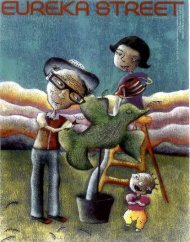25 January 2008 - 1 February 2008 Volume: 18 Issue: 2 Cricket ...
25 January 2008 - 1 February 2008 Volume: 18 Issue: 2 Cricket ...
25 January 2008 - 1 February 2008 Volume: 18 Issue: 2 Cricket ...
Create successful ePaper yourself
Turn your PDF publications into a flip-book with our unique Google optimized e-Paper software.
Caste complicates progress for India’s Dalits<br />
INTERNATIONAL<br />
Peter Hodge<br />
‘I am zero when it comes to caste,’ says Moses Vattipalli. ‘I was<br />
told again and again that I was not fit, I was a Dalit, untouchable,<br />
low-caste man, and leatherwork, that is my caste-work.’<br />
A rare case among Dalits to have escaped the same work as his<br />
father, 30-year-old Moses is Assistant to the National Administrator<br />
of the All India Christian Council. One of his tasks is to record<br />
abuses against Dalits on the organisation’s website. ‘Every day I<br />
have things to report,’ he says. ‘Every day killing, every day a Dalit<br />
was raped, humiliated, beaten up.’<br />
<strong>Volume</strong> <strong>18</strong> <strong>Issue</strong>: 2<br />
<strong>25</strong> <strong>January</strong> <strong>2008</strong> - 1 <strong>February</strong> <strong>2008</strong><br />
This picture of caste-based oppression is at odds with common perceptions of<br />
modern India as an economic tiger and IT superpower. Few Dalits have reaped the<br />
benefits of the recent boom, due to lack of education and ongoing discrimination that<br />
mocks the outlawing of ‘untouchability’ in the Indian Constitution.<br />
Like most Dalit children, Moses’ education about caste status began early. In his<br />
own village, he knew not to take water from the well the upper-caste people used.<br />
But when visiting another village he unwittingly drew from the wrong well. ‘Those<br />
people scolded me because I went there while they were drawing water. I came home<br />
crying.’<br />
The Dalits in Moses’ village are isolated on the eastern side. ‘When the wind<br />
blows, the wind of the Dalits should not touch the upper-caste people,’ explains<br />
Moses. Visiting the village shop, he had to stand at a distance so the shopkeeper<br />
would not be contaminated. ‘When I asked for something from the shop they used to<br />
pack it and throw it. If I catch it, I catch it, otherwise things would fall on the ground<br />
and we have to collect them from the mud.’ Similarly, payment would be thrown to<br />
the shopkeeper and the change tossed back.<br />
The general rule in Indian culture that respect should flow to elders is skewed by<br />
caste. It was painful for Moses to see his father treated with disrespect by upper-caste<br />
children. ‘I used to feel so embarrassed. My father might have had a problem, but he<br />
didn’t do anything because Dalits think it’s their fate.’<br />
Children growing up under such conditions develop a sense of inferiority. That is<br />
precisely the intention. ‘There were many times, I was told I am a Dalit and equal to<br />
©<strong>2008</strong> EurekaStreet.com.au <strong>25</strong>

















